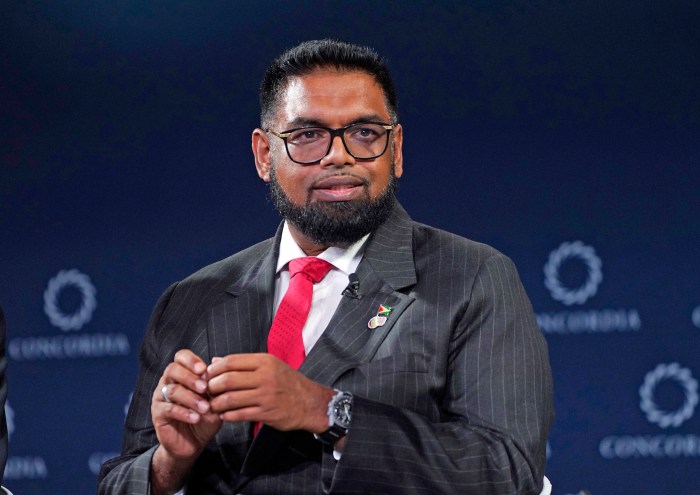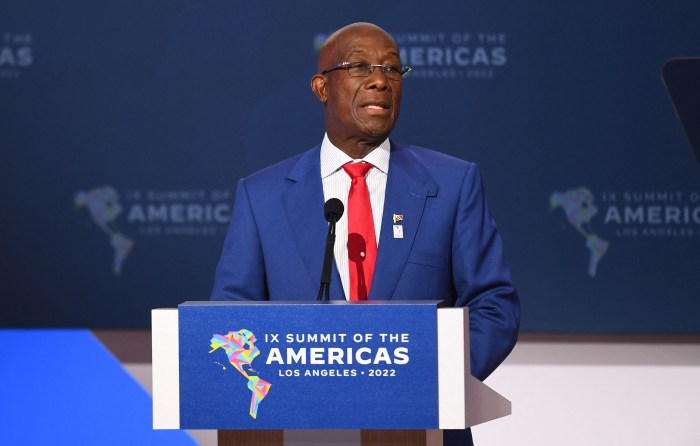The invariably on-point Trinidad Express columnist Sunity Maharaj made note recently of a deliberate effort on the part of Trinidad and Tobago’s Prime Minister, Kamla Persad-Bissessar, to leave no doubt as to who was “running things” in the country. And some latter-day goings-on in government circles there lend credence to Maharaj’s observation. We know not whether this move by Bissessar to cast her own giant shadow over the T&T landscape was motivated by the need for pushback against the well-traveled speculation about a so-called cabal of puppet masters within her administration. But it’s been pretty clear that Bissessar, of her own volition or maybe on the urging of consultant types, decided that hogging the limelight was the preferred way forward.
Over the just concluded holiday period, for instance, residents found themselves greeted by the smiling face of the prime minister on highway billboards, extending best wishes for the season. On every occasion seized by the government as an opportunity for distributing giveaway tokens to the hoi polloi, whether by fiat or otherwise, it has become common practice for said tokens – coffee mugs and all the rest — to be emblazoned with Bissessar’s image. And the prime minister has made a point of maximizing such “gallery” moments, even frequently encroaching on the territory of line ministers in her cabinet once those possibilities for “a show” look promising.
Bissessar’s opting for this ubiquitous presence would seem very much an outlier phenomenon in Trinidad and Tobago or anywhere in the English-speaking Caribbean. Trinidad and Tobago’s first prime minister, Dr. Eric Williams, recalled how taken aback he was, upon visiting Ghana, to find the place festooned with images of Kwame Nkrumah. Williams’ feeling of dismay was no surprise, seeing as how we of the English Caribbean tend to associate that proliferation of leader images with faraway, probably totalitarian regimes. Good fit or not with the T&T psyche, Bissessar and her handlers obviously have concluded that this campaign of merchandising her, personally, every which way beats trying to trumpet the virtues of the government she leads.
The prime minister and her crew are probably guided in this strategy by polling, that has been a conundrum to many, which has shown Bissessar posting better favorability numbers personally than her administration. Even so, given the challenges the government has faced since taking office in 2010, it’s anything but a slam dunk that Bissessar can muster coattails strong enough to tow colleagues to another shot at governing the country.
As we have several times previously said here, with nary a fear of contradiction, Bissessar and her confederates are easily the most brazenly corrupt team ever to walk the corridors of power in Trinidad and Tobago. There has been a bravado, presumably facilitated by an uncharacteristically fat majority the party gained following Patrick Manning’s bone-headed political calculations in 2010, which seemingly morphed into a sense of invincibility. How else to explain the government’s continuous, undaunted reach into wasps’ nests, the consequences of which no even-keeled bunch would dare risk? The flagrant move to install a junior, unqualified officer in one of the nation’s highest national security posts. Or, one section of a criminal justice bill extracted and rushed in the dead of night for presidential assent, evidently as an escape hatch for a couple of party financiers facing jail terms. Or, blatant nepotism and cronyism practiced willy-nilly in all phases of government operations, to the point of being now seen as embedded in the government’s DNA. And so it has gone. The list of deeds by Bissessar’s government that are questionable, bizarre, downright disgraceful…is of historic proportions.
In hopes of offsetting such an orgy of reckless power abuse comes this attempt to create and market a larger-than-life Bissessar personality. It is Bissessar’s or some tactician’s go-to device in the face of ever-present tales of government wrongdoing or suspicion thereof. Government initiatives for the public good, such as they are, have been subsumed by the overwhelming negatives that define the Bissessar administration.
As fate would have it, with this mega selling of the prime minister proceeding apace (elections being expected sometime this year), there’s been another development that looks sure to influence the course of events going forward. The falling oil price, which has now tumbled to below $50.00 per barrel as this is written, is a major factor in Trinidad and Tobago’s fiscal outlook. The Bissessar government has been insisting that the country’s economic stability is not threatened by this collapse in the oil price on the international market — a nugget likely offered as rationale for the spending spree the prime minister has engaged in, doling out enticement goodies. Rationale is elusive, though, when the current T&T budget was based on a projected $80.00 per barrel oil price that is now roughly half that figure.
Bissessar is scheduled to speak to her fellow citizens shortly about where this is all headed.






















